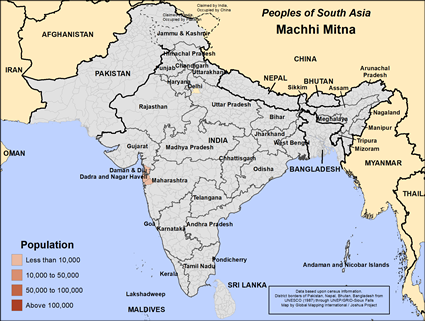Machhi Mitna in India

Send Joshua Project a photo
of this people group. |

Map Source:
People Group data: Omid. Map geography: UNESCO / GMI. Map Design: Joshua Project
|
| People Name: | Machhi Mitna |
| Country: | India |
| 10/40 Window: | Yes |
| Population: | 19,000 |
| World Population: | 19,000 |
| Primary Language: | Gujarati |
| Primary Religion: | Hinduism |
| Christian Adherents: | 0.00 % |
| Evangelicals: | 0.00 % |
| Scripture: | Complete Bible |
| Ministry Resources: | Yes |
| Jesus Film: | Yes |
| Audio Recordings: | Yes |
| People Cluster: | South Asia Hindu - other |
| Affinity Bloc: | South Asian Peoples |
| Progress Level: |
|
Introduction / History
The Machhi Mitna are an indigenous people who live in the western Indian states of Gujarat and Maharashtra. The word "Machhi" means fish. Their main occupation is fishing. The Machhi were originally hunter-gatherers who came to live in permanent villages in recent times. Some Machhi became Muslims during the period of the Mughals and are known as Machiyar today.
The main languages of the Machhi Mitna are Gujarati and Marathi. Many Christian resources are available in both languages including complete Bibles and the JESUS Film.
Where Are they Located?
The Machhi Mitna people live in the Indian states of Maharashtra and Gujarat states in western India mostly in villages along the coast of the Arabian Sea.
What Are Their Lives Like?
Fishing in in the Arabian Sea is the primary livelihood of most Machhi men. They go out daily in small boats carrying three to four men. The fish they catch they sell to other castes, who in turn sell the fish in markets. The Machhi men make the boats and nets they use in their trade. If fishing is bad, the Machhi can starve.
Most Machhi adults are illiterate or functionally illiterate. Their children often leave school early to help their parents make a living. Women take care of the home and work in the fields. A caste counsel deal with legal disputes and promote Machhi interests.
The Machhi marry within their group, often within their clan. Cousins frequently marry their cousins. Sons inherit most property but a man's widow does receive a fraction of her late husband's wealth.
What Are Their Beliefs?
The Machhi practice Hinduism, the ancient religion of India. They worship and serve the gods of the Hindu pantheon and the spirits who inhabit nature. Hindus believe that by performing rituals and good works that they will attain moksha or freedom from the endless cycle of birth, death and rebirth. The Machhi visit Hindu temples and offer prayers, food, flowers, and incense to their gods in hopes of gaining protection and benefits. They do not have a personal or familial relationship with their gods like Christians or Jews. There are many forms of Hinduism, each with its own deities and beliefs.
The main yearly holidays of the Machhi people are Holi, the festival of colors and the start of spring, Diwali, the festival of lights, Navratri, the celebration of autumn and Rama Navami, Rama's birthday.
What Are Their Needs?
The Machhi need help in educating their children and overcoming the adult illiteracy problem. Their villages often lack access to modern medicine, electricity and indoor plumbing. They Machhi need to learn new job skills, which can bring them out of poverty. Most of all, the Machhi need to hear and understand the message of Jesus Christ. He alone can forgive their sins and get them right with the one, true God.
Prayer Points
Pray that believers in western Indian would reach out and share the gospel with the Machhi.
Pray for Machhi families and communities to discover and embrace the free gift of life found by trusting Christ and his finished work.
Pray that God will overthrow spiritual forces of darkness opposing the spread of His Gospel among the Machhi people.